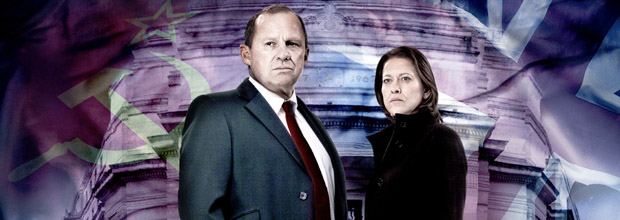
So, what was meant to be a celebration of ten years of Spooks spy-jinks has now become a wake; this autumn, everyone’s favourite MI5 agents will defuse their last bomb, have their final race against time and stage their final set-up. It’s been quite a rollercoaster.
When the first series launched in the summer of 2002, it was easy to dismiss Spooks as Diet 24; a lightweight copy of Kiefer Sutherland’s heavy duty real-time twist fest. The two shows share many things in common – tech savvy, awash with terrorists and traitors and happy to knock off lead characters in a heartbeat, not to mention the stylistic similarities (hand-held action, split-screen visuals, etc.).
But over 80 episodes, Spooks has defined itself as a very different beast: the sub-political double dealing; the clash of personal and professional lives; the diverse threats on offer; the ability to make the preposterous believable. Jack Bauer wore his silliness on his sleeve with a knowing wink; Spooks is as straight-faced as its one constant hero, Sir Harry Pearce.
The early years were arguably the strongest thanks to the shock of the new; here was a series prepared to take risks with its characters, played by a largely unknown cast with a cinematic approach rather than consciously staying in its TV limitations. It featured many real-life threats – Al Qaeda was shamelessly name-checked and Russians and Americans were freely allowed to be evil, rather than let Ruritanian states or rogue factions do all the dirty. At the core of the stories was a young, likeable team – Tom, Zoe and Danny being arguably the best line-up of field agents, more than ably supported by top techies Malcolm and Colin, whilst Harry did the Machiavellian stuff on the bridges and banks of the Thames.
Spooks lost its way for some during the Adam Carter years. Tom Quinn may have been a po-faced lead, but Matthew Macfadyen made him believable and empathetic. Rupert Penry-Jones was perhaps more of a Roger Moore figure (compared with Macfadyen’s Connery) – knowing, never really conveying a sense of being in danger, overruling Harry far too easily and a bit too, well, pretty to convince as a killer – and that’s before his soap opera breakdown. That the threat every week was Arab terrorists didn’t help either.
Nevertheless, the series kicked back into gear with the arrival of Hermione Norris as Ros Myers, the acerbic ballbuster who managed to die twice, uniquely for Spooks. Yet she (if we’re continuing the Bond analogy, the Daniel Craig) often showed a protective side that reflected well on the team members at the time. The broader range of storylines in recent years – the attempted UK coup, the Nightingale conspiracy – also gave the series a much needed injection of diversity.
However, with some more contrived cast exits (how many more ways are there to kill a regular?) and convoluted plot arcs – the Lucas North identity crisis being especially credibility-stretching, despite great performances from Richard Armitage and Iain Glen – the last few series began to suggest that Spooks was starting to run out of steam.
Now, the series’ staple global threats are less focused and available than before – the Cold War, the Balkan and Iraq conflicts, Osama bin Laden and many despotic regimes are retreating into memory, and the only option left soon will be SPECTRE in a hollowed-out volcano and Harry and Ruth finally getting it on in a Space Shuttle orbiting the earth.
This final series sees Harry take centre stage, though he’s essentially done that for some years now. As played by the magnificent Peter Firth, Harry is the cornerstone of Thames House; conscience ridden but uncompromising, tough but tender, most of all towards the love of his life, Ruth Evershed, herself the moral compass of the Grid. Spooks wouldn’t be Spooks without them, and as the final freeze frame turns negative forever, let’s hope Harry and Ruth get the send off they deserve.
> Order the Series 10 boxset on Amazon.
Watch BBC One’s teaser trailer for Series 10…

